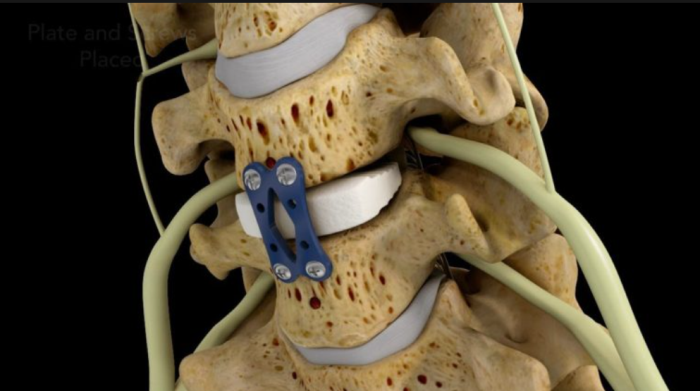Spinal fusion surgery is a procedure that involves permanently connecting two or more vertebrae in the spine. It is performed to eliminate motion between them, providing stability and reducing pain. This surgery is often recommended when other non-surgical treatments fail, such as physical therapy or medication, particularly in cases of severe spinal disorders.
What Is Spinal Fusion Surgery and How Does It Work?
Spinal fusion surgery works by using bone grafts or artificial materials to fuse the vertebrae. These grafts help to stimulate bone growth between the vertebrae, eventually creating a single solid bone. The goal is to eliminate movement that causes pain and restore spinal stability. Recovery time can vary, but the results often lead to improved quality of life.

The Anatomy of the Spine: A Primer
The spine is made up of 33 vertebrae, divided into the cervical, thoracic, lumbar, sacral, and coccygeal regions. It provides support, allows movement, and protects the spinal cord. Understanding this anatomy helps explain why spinal fusion surgery is necessary for stabilizing the spine in certain conditions like herniated discs or fractures.
Why Spinal Fusion Surgery? Exploring the Need for Surgical Intervention
When non-surgical treatments like physical therapy, medications, or spinal injections fail to relieve symptoms of back pain or spinal instability, spinal fusion surgery becomes necessary. This procedure is especially considered when the spine is unable to maintain proper alignment or when chronic pain disrupts daily activities.
The Most Common Spinal Conditions Requiring Fusion Surgery
Common spinal conditions that often lead to spinal fusion surgery include degenerative disc disease, spinal stenosis, and scoliosis. These conditions can cause severe pain and deformity, significantly impacting a person's ability to function. Surgery helps stabilize the spine and relieve the pressure on nerves.
Degenerative Disc Disease: A Leading Cause of Spinal Fusion Surgery
Degenerative disc disease is one of the most common reasons for spinal fusion surgery. It occurs when the discs between vertebrae break down over time, leading to pain, weakness, and instability. Surgery is recommended when the pain becomes chronic and conservative treatments no longer provide relief.
Herniated Discs: When Conservative Treatments Fail
A herniated disc happens when the soft center of a spinal disc pushes out through a tear in the outer layer. This condition can compress nerves, causing pain, numbness, and weakness. Spinal fusion surgery is considered when non-invasive treatments, such as physical therapy and medications, fail to alleviate symptoms.
Spinal Stenosis: Narrowing of the Spine and Its Impact
Spinal stenosis is the narrowing of spaces within the spine, putting pressure on the nerves. This condition can lead to pain, numbness, and difficulty walking. When symptoms are severe and non-surgical options have been exhausted, spinal fusion surgery may be needed to stabilize the spine and relieve nerve compression.

Scoliosis: Abnormal Spinal Curvature and Fusion Surgery
Scoliosis is an abnormal curvature of the spine that can worsen over time, leading to pain, discomfort, and even respiratory issues. In severe cases where the curve progresses rapidly, spinal fusion surgery may be required to straighten and stabilize the spine, preventing further complications.
Spondylolisthesis: Vertebrae Slippage and Fusion Surgery Necessity
Spondylolisthesis occurs when one vertebra slips forward over the one below it, causing spinal instability and pain. If this slippage leads to severe symptoms and is resistant to other treatments, spinal fusion surgery becomes necessary to restore alignment and stability to the spine.
When Should You Consider Spinal Fusion Surgery? A Comprehensive Guide
Spinal fusion surgery becomes necessary when conservative treatments fail to relieve chronic back pain caused by spinal instability, severe disc degeneration, or deformities like scoliosis. You should consider spinal fusion surgery if you experience persistent pain, nerve compression, or mobility issues that impact daily life. Consulting a specialist for proper diagnosis and treatment options is essential for making an informed decision.
Spinal Fusion Recovery: Timeline, Exercises, Tips & Full Guide
Spinal fusion recovery typically takes several months, with the initial weeks focused on managing pain and regaining mobility. Physical therapy plays a crucial role in strengthening the spine, improving flexibility, and speeding up recovery. Following a structured exercise plan and tips from healthcare professionals will ensure a smooth and successful recovery after spinal fusion surgery.
Best Spinal Fusion Surgery in India
The Best Spinal Fusion Surgery in India is characterized by advanced techniques, state-of-the-art technology, and experienced surgeons. Many patients choose India for its high success rates and the availability of minimally invasive procedures, which significantly reduce recovery times and hospital stays.
Spinal Fusion Surgery Cost in India
The Spinal Fusion Surgery Cost in India is significantly lower compared to Western countries, making it an attractive option for patients seeking affordable healthcare without compromising quality. The cost typically ranges from INR 1 lakh to INR 5 lakhs, depending on various factors such as hospital type, surgeon expertise, and individual patient needs.
Best Hospitals for Spinal Fusion Surgery in India
Some of the Best Hospitals for Spinal Fusion Surgery in India include renowned institutions like Apollo Hospitals, Fortis Healthcare, and AIIMS, which are equipped with modern facilities and skilled medical professionals. These hospitals have dedicated orthopedic departments specializing in spinal surgeries, ensuring patients receive top-notch care.
Best Doctors for Spinal Fusion Surgery in India
The Best Doctors for Spinal Fusion Surgery in India are highly qualified orthopedic surgeons with extensive experience in spinal procedures. Many of these specialists have trained internationally and are affiliated with leading hospitals, ensuring patients receive expert care tailored to their unique conditions.
Traumatic Spinal Injuries: When Spinal Fusion Becomes Critical
In cases of traumatic spinal injuries, such as fractures or dislocations, spinal fusion surgery is often necessary to stabilize the spine and prevent further damage to the spinal cord. This surgery helps to prevent paralysis and other complications that could arise from an unstable spine.
Osteoarthritis and Its Role in Spinal Degeneration
Osteoarthritis causes the breakdown of cartilage in the joints, including those in the spine. As the condition progresses, it can lead to pain, stiffness, and spinal instability. When conservative treatments fail to provide relief, spinal fusion surgery may be recommended to restore stability and alleviate symptoms.
Spinal Fractures: When Fusion Surgery Is the Only Option
Spinal fractures can occur due to trauma, osteoporosis, or other medical conditions. When these fractures lead to spinal instability, spinal fusion surgery becomes necessary to prevent further damage and to stabilize the spine. This surgery helps ensure that the bones heal properly and relieves pain caused by the injury.
Inflammatory Conditions: Ankylosing Spondylitis and Spinal Fusion
Ankylosing spondylitis is a form of arthritis that causes chronic inflammation of the spine, leading to stiffness and pain. Over time, the spine can become fused in a fixed, immobile position. In severe cases, spinal fusion surgery may be required to correct deformities and improve posture.
Tumors of the Spine: When Cancer Treatment Requires Spinal Fusion
Spinal tumors can cause instability in the spine due to bone erosion or the spread of cancer. In cases where tumors cause spinal instability or compression of the spinal cord, spinal fusion surgery is performed to stabilize the spine and prevent further damage during cancer treatment.
Infections of the Spine: Rare Causes Leading to Fusion Surgery
Spinal infections are rare but can lead to severe complications, including pain and instability. When an infection causes significant damage to the spine, spinal fusion surgery may be necessary to remove infected tissue and stabilize the affected area.
The Impact of Lifestyle on Spine Health: Are You at Risk?
spinal fusion surgery to repair. Maintaining a healthy lifestyle can reduce the risk of developing severe spinal issues.
Sports Injuries and Their Link to Spinal Fusion Surgery
Sports injuries, particularly in high-impact activities, can lead to fractures, herniated discs, or spinal instability. In severe cases, when these injuries result in chronic pain or reduced mobility, spinal fusion surgery is required to stabilize the spine and allow athletes to recover properly.
Post-Traumatic Stress and Spinal Injuries: A Psychological Perspective
Patients who suffer from traumatic spinal injuries often experience post-traumatic stress disorder (PTSD) due to the physical and emotional impact of their injury. When surgical intervention, like spinal fusion surgery, is required, addressing the psychological aspect is just as important as the physical recovery.
When Is Spinal Fusion Surgery Absolutely Necessary?
Spinal fusion surgery is considered absolutely necessary when the spine is too unstable to support the body, causing severe pain, nerve compression, or deformity. This surgery becomes critical when non-surgical treatments fail, and the patient’s quality of life is significantly impacted by the condition.
Early Diagnosis and Prevention: Can Spinal Fusion Be Avoided?
Early diagnosis and preventive measures such as maintaining a healthy weight, practicing good posture, and engaging in regular exercise can help avoid the need for spinal fusion surgery. In some cases, early intervention with physical therapy or medication can prevent the progression of spinal conditions.
10 FAQs with Answers
What is spinal fusion surgery?
Spinal fusion surgery is a procedure that permanently connects two or more vertebrae to stabilize the spine and reduce pain caused by conditions like degenerative disc disease or spinal stenosis.
What are the most common reasons for spinal fusion surgery?
Common reasons include degenerative disc disease, herniated discs, spinal stenosis, scoliosis, and traumatic spinal injuries that cause instability or severe pain.
How long is the recovery time for spinal fusion surgery?
Recovery time varies, but most patients can expect a few months of limited activity, with full recovery taking anywhere from 6 to 12 months.
Is spinal fusion surgery painful?
Patients typically experience some pain after surgery, but it is managed with medication. Over time, the goal is to reduce the chronic pain they were experiencing before the surgery.
Are there non-surgical alternatives to spinal fusion surgery?
Yes, non-surgical treatments like physical therapy, medications, and spinal injections are often tried first. Surgery is considered when these options fail to relieve symptoms.
Can spinal fusion surgery be avoided?
In some cases, spinal fusion surgery can be avoided with early diagnosis and intervention using conservative treatments. Lifestyle changes can also help prevent the progression of spinal conditions.
What risks are involved in spinal fusion surgery?
Risks include infection, blood clots, nerve damage, and a chance that the bones won’t fuse properly, leading to the need for additional surgery.
Can you live a normal life after spinal fusion surgery?
Most patients can return to their normal activities after recovery, although some may need to avoid high-impact activities that could stress the fused spine.
How successful is spinal fusion surgery?
Spinal fusion surgery has a high success rate, with many patients experiencing significant pain relief and improved mobility.
Is spinal fusion surgery covered by insurance?
Yes, most insurance plans cover spinal fusion surgery if it is deemed medically necessary. However, coverage details may vary depending on the provider and plan.